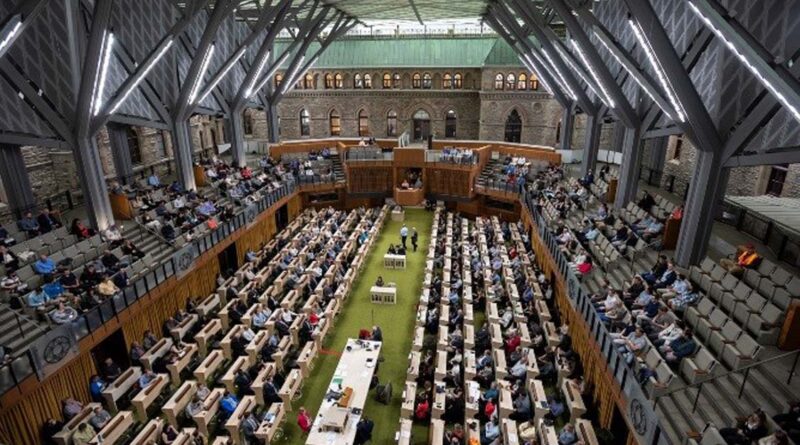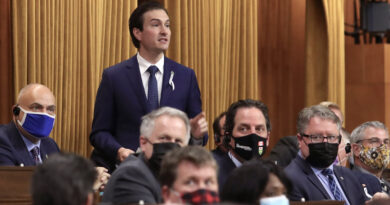Adam Chambers Emergency Act Speech Text
Following is the text of Adam Chambers House of Commons speech during the Emergency Act debate February 17.
Mr. Speaker, it is discomforting to stand here today. It is a sad and dark time for our country. Unfortunately, this does not overstate current events.
I have watched with concern the lawlessness paralyzing Ottawa and key border crossings in Ontario and other provinces. Never before has the Emergencies Act been invoked. It has sat on the shelf during some quite challenging moments in our country.
Viewed as a last resort, this act gives the federal government enhanced powers in times of crisis. Its justification and intricacies of procedures are being worked through the House for the first time. There is no precedent. Instead, we are making precedent. The arguments we make, the evidence we evaluate and the tone we take will be judged by future generations.
Everyone has the right to peacefully protest any government policies. This is a fundamental freedom in a democracy. It protects the rights of individuals to express their views, even when those views are not shared by everyone. While these protests are a fundamental part of democracy, so too is the rule of law. We cannot allow prolonged blockades or barriers that paralyze trade corridors, pipelines, railways, supply routes, ports or urban cores at any time. We are not at liberty to decide which laws should apply in some situations but not others.
In a rule-of-law country, consistency matters. It is the foundation upon which legal precedent is built. People who join protests to encourage violence or the overthrow of government undermine democracy, but let us be very clear. Not everyone who has participated in these protests is looking to overthrow the government. Many are looking just to be heard, peacefully. To them I say that we hear them. I hear them.
Somewhere along the way, we entered a state of lawlessness, but the answer to lawlessness cannot be more lawlessness. The government is asking us to suspend certain laws to deal with those breaking others. We are being asked to undermine democratic principles to address some who wish to see democracy itself undermined.

The threshold for invoking the act is supposed to be high, and quite rightly. This is a temporary law that will give the government awesome and extraordinary powers: powers to freeze assets with no recourse, and to compel citizens to act contrary to their own interests in favour of the state’s.
In the House, just days ago, the Prime Minister presented a timeline. He held a cabinet meeting on Sunday and a caucus meeting on Monday, followed by a meeting with premiers and finally a press conference on Monday afternoon. Why did it take days for the Prime Minister to address the House, and what evidence has he presented?
It is difficult to determine whether the government is justified without adequate information. There were no briefings. No secret intelligence has been shared. Whether it is incompetence or malfeasance is truly regrettable.
Why was the committee not struck immediately? Is there evidence pointing to significantly compromised public safety or impending danger? Should that not have been made immediately available to members, or at least a subset representing all parties? If we wanted to take the politics out of this, information would have been made immediately available. Otherwise, a conclusion might be that this was politics.
Why do ministers of the Crown opt first to give details to media before the House? Ministers have held press conferences and conducted interviews implying that terrorists are at the steps of Parliament, but have offered the House no evidence. Is it then surprising that Canadians are losing faith in our public institutions? Perhaps it is because the Prime Minister and the government have shown the House and institution little respect.
After all, at the beginning of the pandemic, the government proposed giving itself unlimited spending powers for almost two years without the oversight of Parliament. The same government prorogued Parliament to frustrate a committee investigation. To this day, we still have not seen the Winnipeg lab documents that members of the House have asked the government to provide. Forgive me for being skeptical that this move is justified without seeing the evidence.
We must not understate the impact of the ability for individuals to have their bank accounts frozen. This will not just be a 30-day impact. It could affect their ability to receive financial services for 30 years or more. Individuals whose relationship with the state has already been strained, if not completely severed, will be further ostracized from broader society.
This power must be used sparingly, if at all, and the government has provided very little detail on how it intends to use this power. For example, what is the process through which individuals will be identified? Will these powers be confined to protest organizers, or will they apply to anyone who has shown up to Parliament Hill or donated to the cause, no matter how large or small the amount? What recourse, if any, do individuals have against financial institutions if these powers have been mistakenly or unevenly applied?
These powers are not merely incidental. They should not be dismissed, downplayed or underestimated. I approach every decision with an open mind, but the consequences for individuals are too great, and the precedent this sets is too monumental to waive away legitimate questions or concerns. We are setting a dangerous precedent.
We should be very careful before we use the awesome power of the state. That this moment is the seminal moment upon which we would decide to invoke a never-before-used act seems disproportional, when there are other actions that the government could have taken.
We should be very careful about normalizing the use of a blunt tool in circumstances such as these. If we must consider using the Emergencies Act every time there’s a protest that lasts over a certain period of time, we have much bigger problems. In many ways, that the government has resorted to invoking this act is an indictment of its overall handling of the situation.
I am therefore left with no reason but to impress upon my colleagues that the threshold has not been met, and as a matter of law, If I am wrong, the threshold has been seen to be met by a court that the government is not justified in its use of the act.
While the Emergencies Act is the question before the House today, we should reflect on what has led us here and the lessons we may draw for the future. The hallmark of any democracy is the ability to have reasonable debates with each other about how society functions, but somewhere along the way, we have lost the ability to listen to each other or to consider the perspectives of our neighbours. We are too quick to call something black or white and too quick to demand that each other pick a side. Pro or against, right or left, we leave little room for nuance, reflection or compromise anymore. It should be okay to disagree.
I am sympathetic to those who are frustrated with the pandemic and the government’s response. Many of us are frustrated. We are frustrated with overly punitive travel restrictions and redundant and confusing testing requirements, and we are worried about losing livelihoods because of making a medical decision.
We have seen rules that seem more often grounded in politics than in science. This has left deep divisions in society that will take some time to heal. It has been a long two years, and there are no clean hands in this battle of rhetoric.
It is therefore up to all of us to be part of the solution. I am left to consider whether I could have been quicker to call out abhorrent behaviour, or how I could have shown greater empathy to my neighbours. What can I do now to be a positive actor inside and outside of the House?
The tone must start from the top. The Prime Minister must be hopeful, because Canadians need to see a hopeful way ahead. Continued hyperpoliticization will only make the situation worse. It is not leadership when a prime minister discounts and dismisses the views of millions of Canadians with whom he disagrees. It stigmatizes, sows division and escalates.
We must show empathy over judgment, promote dialogue over silence and prefer persuasion over coercion. We must be looking for opportunities to de-escalate. We need to bring people closer instead of pushing them further away.
Great leaders possess the capability of self-reflection. We must acknowledge the possibility that people descended on our nation’s capital, or crowded overpasses across the country, in part because of their frustration with being demeaned and marginalized for political gain. It suggests that self-reflection is required.
In 2013, the Prime Minister, as the leader of the opposition, said, “The role of the prime minister is to build a stronger country, not make it easier to break apart.” This is a time for leadership. This is the prime minister I would like to see show up for work. Canadians are depending on him.
(Photos Supplied) Main: Canadian House of Commons.




